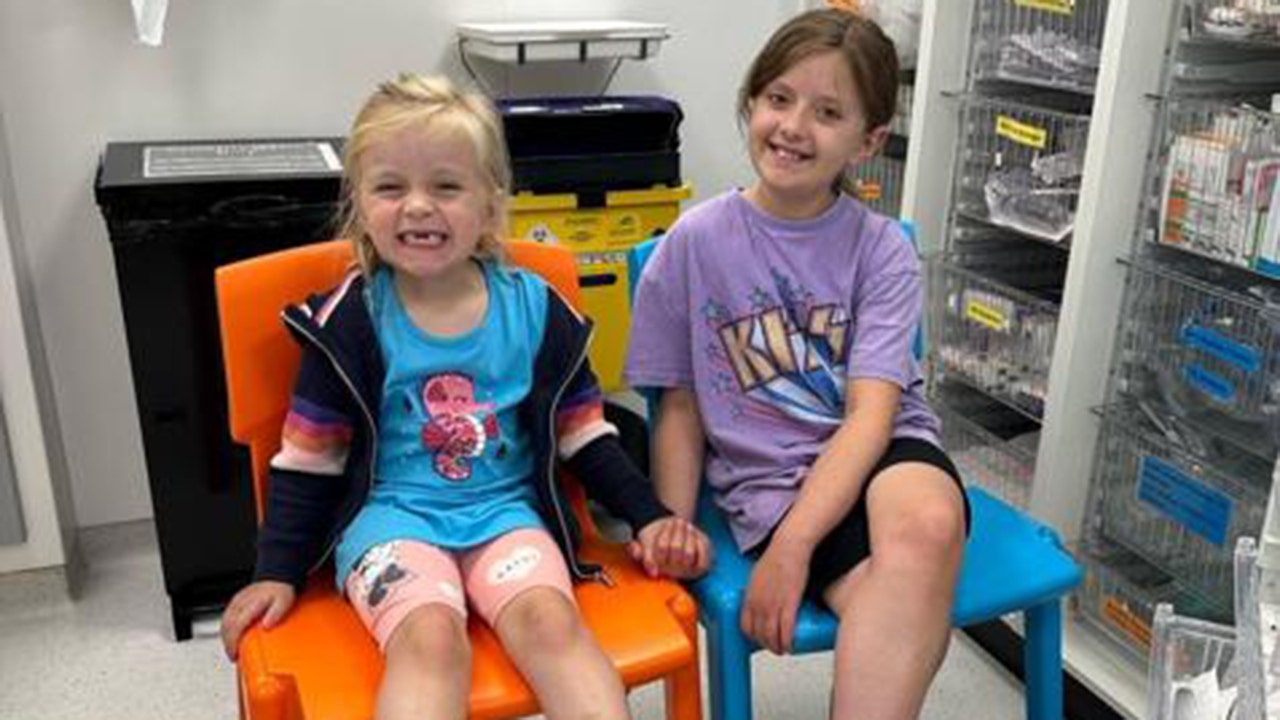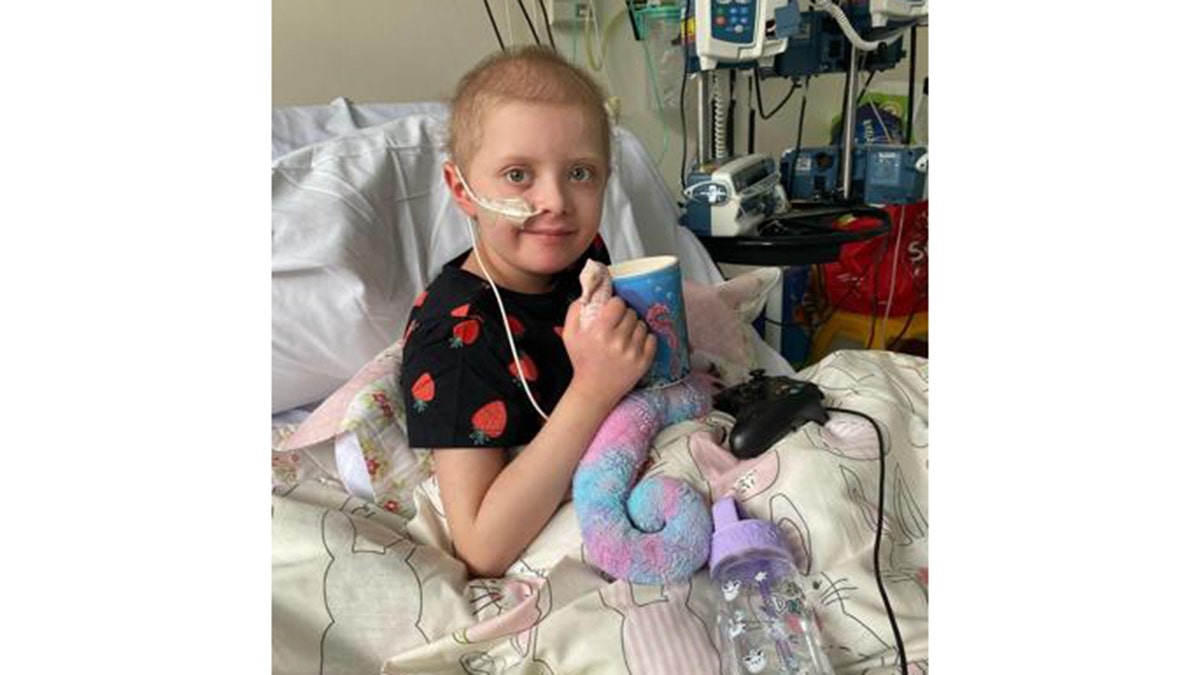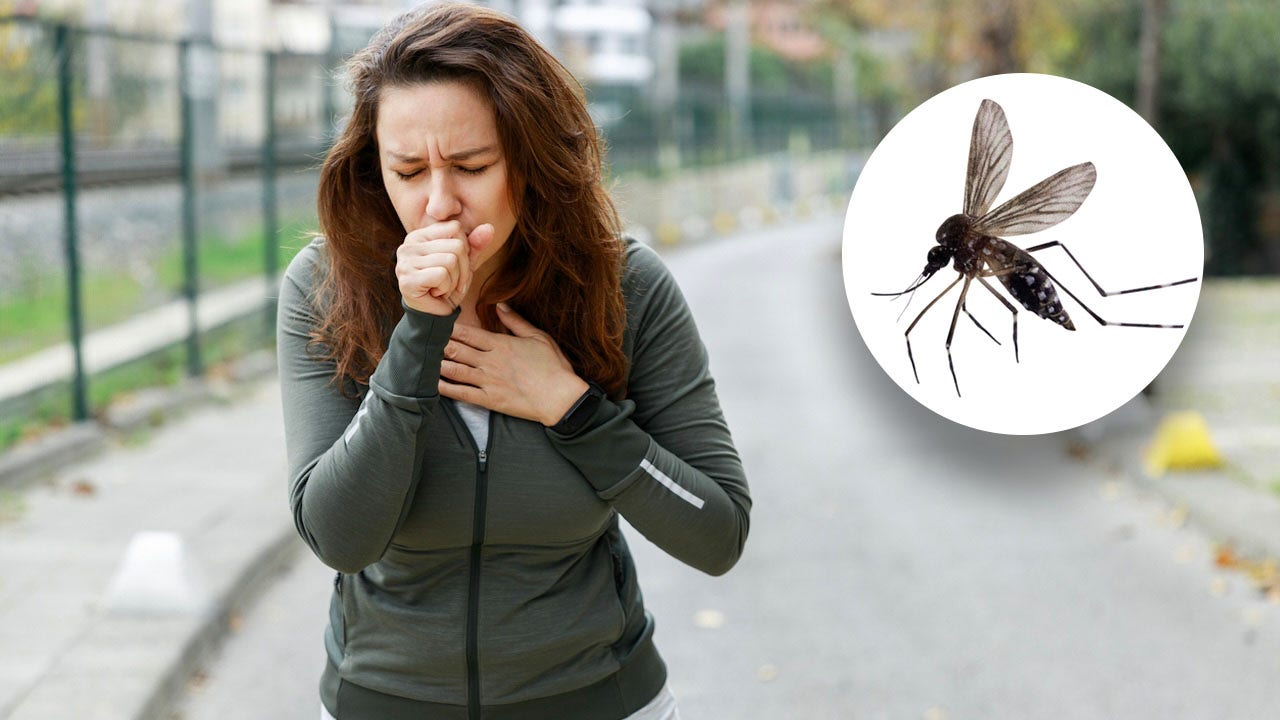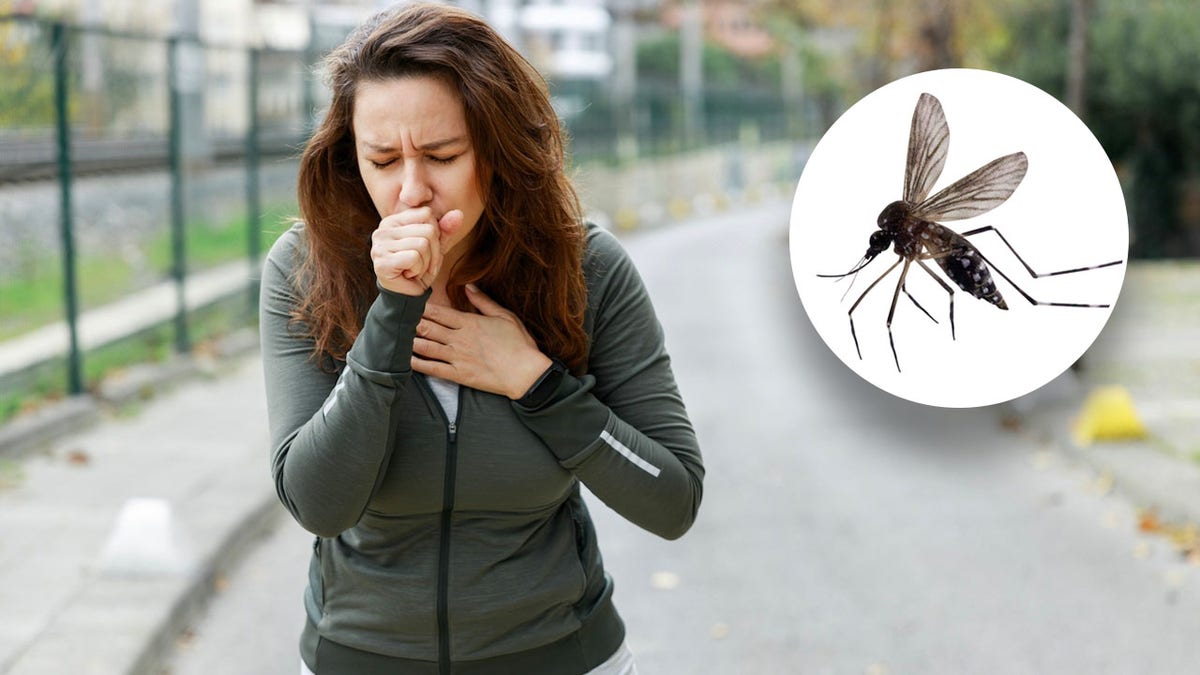Health
Young girl survives cancer thanks to little sister’s lifesaving donation: 'A perfect match'

A young girl in the U.K. is in cancer remission thanks to her sister’s lifesaving bone marrow donation.
Ruby Leaning, 10, was diagnosed with acute lymphoblastic leukemia after collapsing on the school playground in Jan. 2020, according to SWNS, the British news service.
The rare blood cancer required an urgent bone marrow transplant to keep the 6-year-old alive.
AI COULD PREDICT WHETHER CANCER TREATMENTS WILL WORK, EXPERTS SAY
After several tests, Leaning’s then 2-year-old sister, Mabel Leaning, came up as a “perfect match.”
The Leaning sisters’ grandmother, Amanda Fawcett, confirmed to SWNS that Ruby Leaning received treatment with Mabel Leaning’s stem cells.
Sisters Mabel Leaning, left, and Ruby Leaning hold hands in the hospital. The younger sister saved the older one with a bone marrow transplant. (Amanda Fawcett via SWNS)
Ruby Leaning was declared cancer-free in 2022 — meaning Mabel Leaning “saved Ruby’s life for sure,” Fawcett said.
“She’s a happy, normal and healthy 10-year-old who loves swimming, dancing and piano lessons.”
“We [weren’t] expecting her to be a match at first, but thankfully she was, so we just couldn’t believe our luck,” she said.
“It was amazing – we were so thankful.”
SOME BREAST CANCER PATIENTS COULD BE AT RISK OF ANOTHER TYPE OF CANCER, STUDY REVEALS
Fawcett recalled the moment her granddaughter was diagnosed with cancer at Sheffield Children’s Hospital.
“It’s just every parent and grandparent’s nightmare,” she said to SWNS.

Ruby Leaning, pictured in the hospital, was diagnosed with acute leukemia in 2020. (Amanda Fawcett via SWNS)
“I was in the room with her mom when we found out, and you just can’t take anything in at all. It was all just heart-shattering.”
Fawcett described her granddaughters as “so close,” telling SWNS that they are “amazing girls.”
“They’ve got a great relationship between them,” she said.
CLICK HERE TO SIGN UP FOR OUR HEALTH NEWSLETTER
“But Mabel will be asking to borrow Ruby’s shoes when she realizes [she saved her life] – and we do laugh about how it will be fun and games.”
Fawcett said Ruby Leaning has been “doing fantastic” in remission and is “back to her normal self.”

Ruby and Mabel Leaning have “a great relationship between them,” grandmother Amanda Fawcett said. (Amanda Fawcett via SWNS)
“She’s a happy, normal and healthy 10-year-old who loves swimming, dancing and piano lessons,” she said.
The grandmother is currently raising money for the Parents Association of Children with Tumors and Leukemia (PACT), which supported the Leaning family, according to SWNS.
“None of us could be there for Ruby, which was horrendous for us, because of the pandemic,” Fawcett shared.
“But they were an amazing support.”
Fox News Digital reached out to Sheffield Children’s Hospital for additional comment.
For more Health articles, visit www.foxnews.com/health.

Health
What Happens If You Eat Eggs Every Day? Nutritionists Share the Benefits

Sign Up
Create a free account to access exclusive content, play games, solve puzzles, test your pop-culture knowledge and receive special offers.
Already have an account? Login
Forgot your password?
Get back to the Sign In
Use left and right arrow keys to navigate between menu items.
Use escape to exit the menu.
Health
Ask a doctor: ‘I swallowed a bug — now what should I do?'

Most people have experienced that moment of discomfort when they realize a bug has wound up where it shouldn’t be — in their windpipe.
That includes Taylor Swift, who on more than one occasion has accidentally swallowed a bug while performing on stage in front of thousands of people.
It can be a startling and somewhat disgusting occurrence — but is this dangerous, or just a nuisance?
LOCAL DENGUE FEVER CASES CONFIRMED IN FLORIDA KEYS, SPREAD BY MOSQUITO BITES
Dr. Raj Dasgupta, a quadruple board-certified physician in California, shared with Fox News Digital the true impacts of accidentally swallowing a bug, and the best thing to do if it happens.
“Swallowing a bug can often happen accidentally when you’re eating or drinking outside, or if a bug flies into your mouth,” Dasgupta, who serves as chief medical advisor for Fortune Recommends, told Fox News Digital via email.
Dr. Raj Dasgupta, a quadruple board-certified physician in California, discussed the impact of accidentally swallowing a bug — and the best thing to do if it happens. (Sleepoplis)
“It can also happen if you’re talking or laughing outdoors. Sometimes it might even happen indoors if bugs are in your food or drink and you don’t realize it.”
ASK A DOCTOR: ‘HOW CAN I PREVENT SCARRING FROM BUG BITES AND POISON IVY?’
Swallowing a bug is usually not dangerous, Dasgupta noted.
“The stomach’s digestive acids usually break down the bug, and it is passed out of the body without causing harm,” he said.

“Swallowing a bug can happen accidentally when you’re eating or drinking outside, or if a bug flies into your mouth,” the doctor told Fox News Digital. (iStock)
If the bug carries harmful bacteria or parasites, however, it could cause gastrointestinal issues or allergic reactions, according to the doctor.
The type of bug can make a difference, he said.
“Bugs like beetles or ants are less of a concern, but bugs that are known to spread diseases — such as mosquitoes — might be riskier.”
If you happen to swallow a bug, drinking some water can help wash it down, Dasgupta said.

Taylor Swift has announced the accidental swallowing of bugs, mid-concert, on more than one occasion. (Marcelo Endelli/TAS23/Getty Images for TAS Rights Management)
“If you start feeling sick, like abdominal pain, vomiting or nausea, keep an eye on your symptoms,” the doctor said.
If you have severe stomach pain, ongoing vomiting, trouble breathing, or swelling, rash or itching, Dasgupta said to see a doctor.
CLICK HERE TO SIGN UP FOR OUR HEALTH NEWSLETTER
“If you know the bug could have diseases or if you have health conditions that might complicate things, it’s a good idea to get checked out to be safe,” he added.
For more Health articles, visit www.foxnews/health
Some bugs — including grasshoppers, beetles, termites, mealworms and even stink bugs — are actually considered edible in certain countries, and are prepared and eaten as part of meals, according to WebMD’s website.
Health
“I’m a Dietitian, and Here’s Why an Overly Restrictive Diet Can Backfire”

Sign Up
Create a free account to access exclusive content, play games, solve puzzles, test your pop-culture knowledge and receive special offers.
Already have an account? Login
Forgot your password?
Get back to the Sign In
Use left and right arrow keys to navigate between menu items.
Use escape to exit the menu.
-

 World1 week ago
World1 week agoOne dead after car crashes into restaurant in Paris
-

 Midwest1 week ago
Midwest1 week agoMichigan rep posts video response to Stephen Colbert's joke about his RNC speech: 'Touché'
-

 News1 week ago
News1 week agoVideo: Young Republicans on Why Their Party Isn’t Reaching Gen Z (And What They Can Do About It)
-

 Movie Reviews1 week ago
Movie Reviews1 week agoMovie Review: A new generation drives into the storm in rousing ‘Twisters’
-

 News1 week ago
News1 week agoIn Milwaukee, Black Voters Struggle to Find a Home With Either Party
-

 Politics1 week ago
Politics1 week agoFox News Politics: The Call is Coming from Inside the House
-

 News1 week ago
News1 week agoVideo: J.D. Vance Accepts Vice-Presidential Nomination
-

 World1 week ago
World1 week agoTrump to take RNC stage for first speech since assassination attempt















